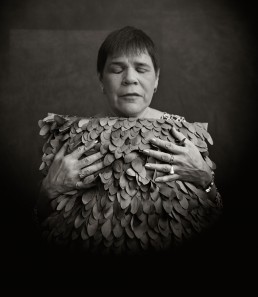S1: Episode 11 - Olivia Chavez

Episode Information
[Intro Music]Narrator: Welcome to My Heart is Not Blind. Narrative histories about blindness and perception. A traveling exhibition and book published by Trinity University Press, supported by Kronkosky Charitable Foundation, edited and hosted by Michael Nye. Every person. Every place is a map to somewhere else. Episode 11, Olivia Chavez.
Olivia: I, I was mugged once, walking home, broad daylight, and I realized just by the sound that I was in an alley, and all of a sudden I had this chill down my spine and I thought, somethings are about to happen. And I thought, just keep walking. And I started to speed up. And all of a sudden he grabbed me and he let go. He didn’t force himself on me or anything, and I thought he took my wallet and I got into the street, and then I was disoriented. But yet I’m not afraid to walk alone. It didn’t stop me. I don’t remember going blind. But the cause is malignant tumors. It’s called retinol blastoma. I was two years old when I had both my eyes extracted due to cancer. Blindness isn’t a punishment. Uh, my mom tells me that shortly after I came home from the hospital, my eyes were both bandaged, you know, for them to be healed.
Mom never hid me. She would take me to the store and people would run after her and ask her, what’s wrong with your daughter? Why are eyes bandaged? What happened? And she would explain to them that I had cancer and I had to have some surgery. And they said, well, you must have done something. You know, God punished you. Or they would say, well, she had cancer. Why didn’t you just let her die? How was she going to live that way? And my mother would use some expletives and just tell them, leave me alone. Go away. We had a, a very humble home. We didn’t have any water in the house. We had a, a community, um, faucet for drinking and cooking and bathing, and we stayed in that house five years on, on Durango Street. When I was five, my mom told me that I was going to the Texas School for the Blind.
I asked her why, and she says, because you have to learn to do things differently, like to read with your fingers because you cannot see. So I went to the school for the blind, and it was very hard for me. The culture was so different. I mean, I was brought up eating beans and potatoes and a little bit of meat every now and then. So I was always crying. I was always in the infirmary. I was very lonely, and I was punished for speaking Spanish. I knew, please, thank you. Bathroom, water, food, that’s all the English I knew.
The public needs to know that, aside from not seeing, we’re just like everyone else. We have faults. I knew a man in, uh, Fort Worth who murdered someone, and he’s totally blind. Sometimes people think that we’re all little angels and we’re not. We’re angry types, we’re optimistic types, just like anyone else. Blindness doesn’t mean that I can’t see because I can, I see in my own way. But when you say lake, right away, I start thinking of the, the sounds. Uh, I can think of the temperature of it, that it’s cool, the smells, you know, the, if there’s grass around, I can feel myself walking, trees, hearing the wind blowing through the trees. I love that sound.
One, one day I was on the city bus, and as I boarded, this lady started talking to her friend or relative saying, oh, poor thing. She’s blind. And I was in one of my moods. I just thought, I can’t handle this today. I said, excuse me. I work, I take care of myself. There is not anything poor about me. I bet I make three times your salary. The lady didn’t respond to me, but I noticed that everyone on the bus stopped talking later. I felt badly, and I, I felt ashamed. I feel that I don’t live in the dark because I have my other senses that give me information. And actually, darkness isn’t necessarily negative because it’s a time when you can be quiet and you can think of being more humble.
A few years ago when I took a trip to the Grand Canyon, I remember so much about it in, in terms of the weather. We had sun for a bit. We had cold, but it was such a peaceful feeling. And standing at the rim, I could feel the vastness, the enormity of the canyon, even even with the breeze. And, and it was quiet. Something came over me. I felt a chill. I was even shaky a little bit. Not scared, just it impressed me. And I don’t know if it’s the same feeling that someone that sees it feels, but that’s what I felt. I felt small.
[Outro Music]
Host: This is Michael Nye, and you have been listening to a podcast of narrative histories. To understand another person, you must consider things from his or her point of view. Olivia grew up and lives in El Paso, Texas, and works at the Education Service Center for visually impaired and deaf blind children. She told me, I don’t feel like I live in the dark. However, darkness isn’t something negative because it’s a time when you can reflect, a time when you can be quiet and slow down a time to be more humble.
Join us next week, two new episodes will be released. Please subscribe, rate, and review this podcast. You can also go to my website, michaelnye.org/podcast for transcripts, and other information. There are so many ways. Different ways to experience moments to their fullest. Thank you for listening.
